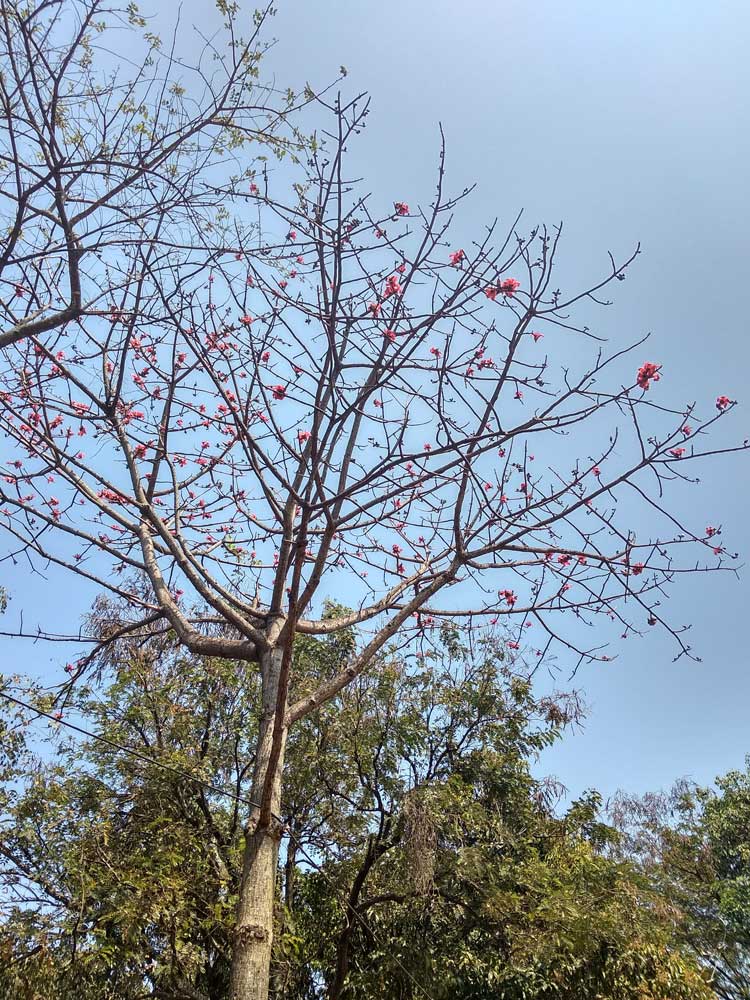Semal - Silk Cotton Tree

Bombax ceiba
Summary
Scientific Classification
Kingdom: Plantae
Division: Magnoliophyta
Class: Magnolipsida
Order: Malvales
Family: Malvaceae
Genus: Bombax
Species: B.ceiba
Scientific Name: Bombax ceibaL.
Common names
English : Silk Cotton, Red silk cotton tree.
Hindi: Shimbal, Kaantisenbal.
Kannada: Booraga, Kempuburuga.
Marathi: Saanvar, Saanvari.
Discription
- Habit and Habitat: 10-30m tall, perennial, large-sized, deciduous tree.Hot, dry river valleys, savannah; at elevations below 1,400 meters’ in southern China. Humid lowland deciduous forests Often found near stream banks.
- Distribution: E. Asia - southern China, Indian subcontinent, Myanmar, Thailand, Laos, Vietnam, Malaysia, Indonesia, Philippines to Papua New Guinea and Australia.
- Morphology:
Leaf: : Compound, digitate, leaflets 2-7, dorsiventral, entire, unicostate reticulate venation, oval or lanceolate, acute at the base, with a sharp point at the apex, petiolate, stipulate (free lateral and caducous), alternate, pentastichous.
Inflorescence: Solitary or cluster of several extra-axillary flowers. At the time of flowering, the tree becomes almost leafless.
Flowers: Complete, pedicellate, bract caducous, actinomorphic, bisexual, pentamerous, hypogynous, cyclic, epicalyx absent.Calyx made up of sepals 5, gamosepalous, cup-shaped, persistent, fleshy, leathery, greenish-purple, valvate.Corolla made up of petals 5, polypetalous, scarlet, twisted. Petals fleshy, sessile, entire, oblong, 2-3” long, tomentose and covered with stellate hairs on both sides.
Androecium: Stamens numerous (about 70), polyadelphous, forming staminal groups or bundles, one staminal bundle around the carpel while 5 bundles towards the periphery alternating with petals.
Gynoecium: composed of 5 carpals, syncarpous, superior, pentalocular, 2-4 ovules in each locule, axile placentation, style simple, pentangular, glabrous, stigmas 5, scarlet.
Fruit: An oblong, 4-5” long, loculicidal capsule.
Flowering and Fruiting time: February-March. - Propagation: Through seeds.
-
Importance:
a.They are highly valued as a curry vegetable. The young roots are diuretic and tonic. The gum is astringent, demulcent and tonic. The flowers are astringent and refrigerant. Roots yield a medicine used in impotency.
b.Fibers are used in filling cushions.
c.Wood is used in preparing match boxes and match sticks. - Location: Botanical garden, New building area.
 Trees of GSS Project supported by Makerspace Belgaum Website concept and designe by
Trees of GSS Project supported by Makerspace Belgaum Website concept and designe by